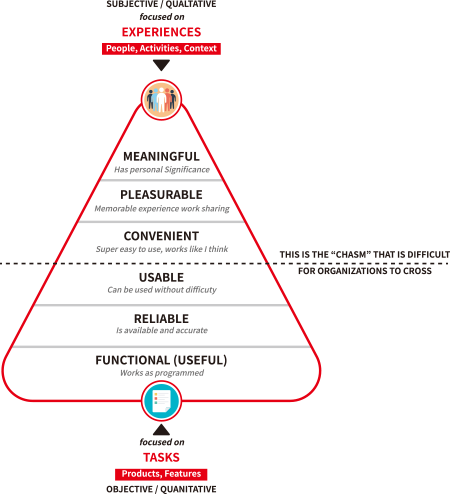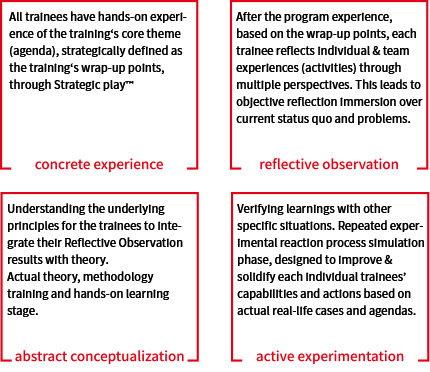the/playcompany designs learning experiences with innovative and multidimensional approaches, based on experience design and Gamification theories. In addition, we add our small hopes of making every trainees’ experience a fun, surprisingly positive experience that they will remember. Every experience stimulates meta-cognition and empathy, which leads to change and growth through interaction. We firmly believe therefore, that a strategic design of learning experience will really open a new world that has never existed before. This philosophy and belief that may seem at first naïve has in effect become our core way of thinking and way of working – starting from our first content development more than ten years ago, which continues on today.
LXD
Learning experience design
Is it possible to teach how to ride a bicycle with Powerpoint slides? Most training or learning tend to traditionally focus on the task instead of the experience. This is the reason why we see so often all around us, corporate training that basically try to teach employees how to ride a bicycle using Powerpoint slides. Learning experience does not only mean the training location, material, tests or the trainer. Task-centric training design could be practical, logical and “comfortable”, but is by definition not trainee-centric – therefore making evolution into a fun, meaningful, immersive learning experience a big challenge.

LXD (Learning experience design) is the backbone to all of the/playcompany’s basic content development & program design, which focuses on the “first experience, then learn” principle. LXD facilitates the trainees to perceive training as an experience, in the process stimulate trainees’ meta-cognition through self-immersion in both the process and the result, and aim to derive effective realization and empathetic learning based on interactive feedback and reflection.
LXD utilizes experience as the core element of learning. In reality, learning through experience is nothing new – rather, it is one of the oldest, most tried and tested, effective methods of learning in humankind’s history. However, in order to evolve training from the typical one-directional training that relies heavily on the trainers’ individual capabilities, to truly maximizing interaction through trainees’ voluntary participation, every part of the design process must be strategically and precisely planned – including analysis of trainees’ psychological and characteristic profiles & needs, core message, content development and dynamic structure architecture.
LXD, therefore, is rooted on the below five principles:
+ Learning comes from experience, and every experience is special to each individual.
+ Experience consists of social, cognitive and emotional context elements.
+ Learning is a never-ending, holistic process, which focuses on both the process and the result.
+ LXD focuses on the interaction and dynamic between the user and the group.
+ The most effective design is through an integrated approach, utilizing multiple medium facilitating experiences.




In order to successfully create LXD based on these principles, it is essential to guide the trainee consecutively through the LXD process (see Image / based on David A. Kolb’s ELM Theory) – in other words, a more integrated and multi-dimensional learning experience design is crucial for success. First and foremost, the trainee must have a very specific experience through strategically developed content. Only based on this experience can the trainees share feedback and interact with each other regarding multiple issues that surfaced throughout the experience – which then leads to reflective observation and objective growth. The learning process should not stop here – it needs to be then looped back into a more abstract, conceptual phase which connects the dots between the experience and interaction to practical theory and methods, where actual implementable simulations need to be repeatedly experienced and solidified. By following this process, it is possible to attain real learning-by-doing effect, which becomes in turn implementable in real life situations at work after the training, and therefore creates a sustainable output.
theplaycompany
add. 06222 6F Arena Bld., 425, Eonju-ro, Gangnam-gu, Seoul, Korea tel. 82 2 545 7234 fax. 82 2 545 6230 mail. info@theplaycompany.co.kr
Corporate registration number. 592-86-00430 CEO. Yoon Jung Kang
© 2022 theplaycompany all rights reserved
theplaycompany
add. 06222 6F Arena Bld., 425, Eonju-ro, Gangnam-gu, Seoul, Korea
tel. 82 2 545 7234 fax. 82 2 545 6230
mail. info@theplaycompany.co.kr
Corporate registration number. 592-86-00430
CEO. Yoon Jung Kang
© 2022 theplaycompany all rights reserved
